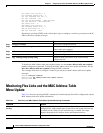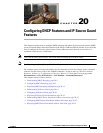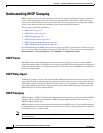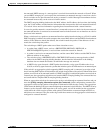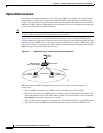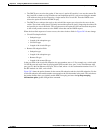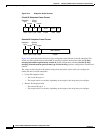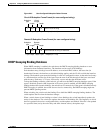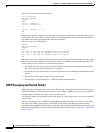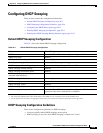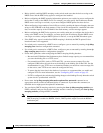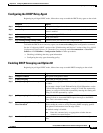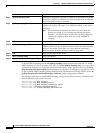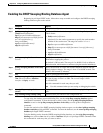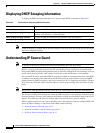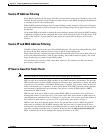
20-8
Catalyst 2960 and 2960-S Switch Software Configuration Guide
OL-8603-09
Chapter 20 Configuring DHCP Features and IP Source Guard Features
Understanding DHCP Snooping
This is the format of the file with bindings:
<initial-checksum>
TYPE DHCP-SNOOPING
VERSION 1
BEGIN
<entry-1> <checksum-1>
<entry-2> <checksum-1-2>
...
...
<entry-n> <checksum-1-2-..-n>
END
Each entry in the file is tagged with a checksum value that the switch uses to verify the entries when it
reads the file. The initial-checksum entry on the first line distinguishes entries associated with the latest
file update from entries associated with a previous file update.
This is an example of a binding file:
2bb4c2a1
TYPE DHCP-SNOOPING
VERSION 1
BEGIN
192.1.168.1 3 0003.47d8.c91f 2BB6488E
interface-id
21ae5fbb
192.1.168.3 3 0003.44d6.c52f 2BB648EB
interface-id
1bdb223f
192.1.168.2 3 0003.47d9.c8f1 2BB648AB
interface-id
584a38f0
END
When the switch starts and the calculated checksum value equals the stored checksum value, the switch
reads entries from the binding file and adds the bindings to its DHCP snooping binding database. The
switch ignores an entry when one of these situations occurs:
• The switch reads the entry and the calculated checksum value does not equal the stored checksum
value. The entry and the ones following it are ignored.
• An entry has an expired lease time (the switch might not remove a binding entry when the lease time
expires).
• The interface in the entry no longer exists on the system.
• The interface is a routed interface or a DHCP snooping-trusted interface.
DHCP Snooping and Switch Stacks
DHCP snooping is managed on the stack master. When a new switch joins the stack, the switch receives
the DHCP snooping configuration from the stack master. When a member leaves the stack, all DHCP
snooping address bindings associated with the switch age out.
All snooping statistics are generated on the stack master. If a new stack master is elected, the statistics
counters reset.
When a stack merge occurs, all DHCP snooping bindings in the stack master are lost if it is no longer
the stack master. With a stack partition, the existing stack master is unchanged, and the bindings
belonging to the partitioned switches age out. The new master of the partitioned stack begins processing
the new incoming DHCP packets. For more information about switch stacks, see Chapter 7, “Managing
Switch Stacks.”



